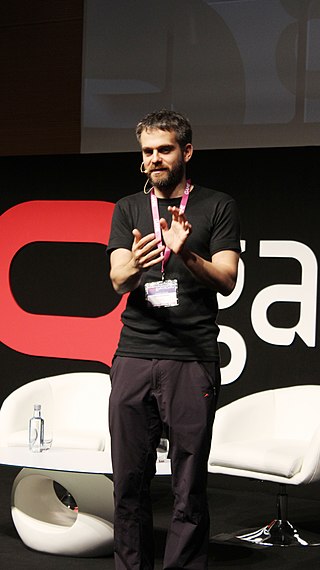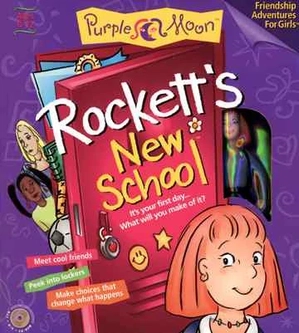Related Research Articles

Eric Zimmerman is an American game designer and the co-founder and CEO of Gamelab, a computer game development company based in Manhattan. GameLab is known for the game Diner Dash. Each year Zimmerman hosts the Game Design Challenge at the Game Developers Conference. He is also the co-author of four books including Rules of Play with Katie Salen, which was published in November 2004. Eric Zimmerman has written at least 24 essays and whitepapers since 1996, mostly pertaining to game development from an academic standpoint. He's currently a founding faculty at the NYU Game Center.

Brenda Laurel is an American interaction designer, video game designer, and researcher. She is an advocate for diversity and inclusiveness in video games, a "pioneer in developing virtual reality", a public speaker, and an academic.

Brenda Louise Romero, previously known as Brenda Brathwaite, is an American game designer and developer in the video game industry. She was born in Ogdensburg, New York and is a graduate of Clarkson University. Romero is best known for her work on the Wizardry series of role-playing video games and, more recently, the non-digital series The Mechanic is the Message. She has worked in game development since 1981 and has credits on 49 game titles.

An indie game, short for independent video game, is a video game created by individuals or smaller development teams without the financial and technical support of a large game publisher, in contrast to most "AAA" (triple-A) games. Because of their independence and freedom to develop, indie games often focus on innovation, experimental gameplay, and taking risks not usually afforded in AAA games. Indie games tend to be sold through digital distribution channels rather than at retail due to a lack of publisher support. The term is analogous to independent music or independent film in those respective mediums.
Tale of Tales BVBA is a Belgian developer of art games founded in 2003 by Auriea Harvey and Michaël Samyn, who had been working together in the creation of Web sites and electronic art as Entropy8Zuper! since 1999. In an interview by Nightmare Mode, Michael Samyn explained their motivations to create interactive art and disappointment at the lack of evolution in interaction of games.

Jonatan Söderström, also known as Cactus, is a Swedish video game developer noted for his unusual and innovative games. He is best known as the co-designer and programmer of Hotline Miami (2012) and Hotline Miami 2: Wrong Number (2015), but had prior to those games developed over 40 small freeware games, many of which were reviewed and lauded even in the mainstream video game press. His game Clean Asia! was nominated for both Excellence In Visual Arts and Excellence in Audio at the Independent Games Festival in 2008. In 2010, he won the IGF's Nuovo Award, which honours unconventional game development, for his puzzler Tuning.

IndieCade is an international juried festival of independent games. Game types include video games, live-action games, and tabletop games. Independent game developers are selected to demo, screen, and promote their work at the annual IndieCade festival and showcase events. IndieCade also includes a conference track featuring classes, panels, workshops, and keynotes. Since 2020, the annual festival has taken place online under the name IndieCade Anywhere & Everywhere.

Daniel Benmergui is an independent game designer from Buenos Aires, Argentina known for the creation of art games such as Today I Die, I Wish I Were the Moon, and Storyteller.

Robin Hunicke is an American video game designer and producer. She is a professor of game design at UC Santa Cruz and the co-founder of Funomena.

Sportsfriends is a party video game created by the Danish independent developer collective Die Gute Fabrik. It consists of four games: Johann Sebastian Joust, Super Pole Riders, BaraBariBall, and Hokra. Planned for release on the PlayStation 3, PlayStation 4, Windows, Mac, and Linux, the game was funded through Kickstarter and received over US$150,000 from backers.

Proteus is a 2013 adventure game designed and created by Ed Key and David Kanaga for Microsoft Windows, OS X, Linux, PlayStation 3, PlayStation 4 and PlayStation Vita. In the game, the player traverses a procedurally generated environment without prescribed goals. The world's flora and fauna emit unique musical signatures, combinations of which cause dynamic shifts in audio based on the player's surroundings.

Terry Cavanagh is an Irish video game designer based in London, England. He has created over two dozen games, most notably VVVVVV, Super Hexagon, and Dicey Dungeons.

Adam Saltsman, also known as Adam Atomic, is an American indie video game designer best known for creating the endless runner Canabalt. He is a founder of Semi Secret Software and Finji video game studios.

Mikengreg is an independent video game development team of Mike Boxleiter and Greg Wohlwend. Their games include Solipskier, Gasketball, and TouchTone. The two met in a game development class at Iowa State University and later began to collaborate on the Adobe Flash game Dinowaurs. When the project was funded, they founded Intuition Games with other college friends in Ames, Iowa, where they worked on small Flash games such as Gray, Liferaft, and Fig. 8 for Flash game sites such as Kongregate. Dinowaurs was one of the first games signed for the Kongregate platform. Their other games involved controlling the weather, influencing individuals in a riot, and riding a bicycle. Boxleiter and Wohlwend worked on several additional games that were put on hiatus.

itch.io is a website for users to host, sell and download indie video games, indie role-playing games, game assets, comics, zines and music. Launched in March 2013 by Leaf Corcoran, the service hosts over 700,000 products as of April 2023.
Renga is a shoot 'em up video game developed and published by British studio wallFour. Designed for movie theaters for up to one hundred players, players are given laser pointers and are tasked with cooperatively building and defending a space ship. It was showcased at 2012's Indiecade, where it won the Developers Choice Award.

Rockett's New School is a 1997 girl-oriented video game developed by Silicon Valley-based Purple Moon. It was directed by Brenda Laurel.

The Freeplay Independent Games Festival is Australia's longest-running and largest independent games festival, first established in 2004. The Festival celebrates fringe artists and game makers, and highlights grassroots developers and art games. It gathers artists, designers, programmers, writers, gamers, creators, games critics, games academics and students to celebrate the art form of independent games and the culture around them.

Sarah Horn Elmaleh is an American voice actress. She is known for her work in the indie video games Gone Home (2013) and Where the Water Tastes Like Wine (2018) and AAA titles such as Final Fantasy XV (2016), For Honor (2017), and Anthem (2019). Elmaleh became involved with the SAG-AFTRA union after she moved from New York City to Los Angeles in 2015. In 2019, she founded the multilingual, online games conference gamedev.world with game developer Rami Ismail.
References
- 1 2 3 Velocci, Carli. "How to address the lost history of girls' games". ZAM. No. 5 November 2015. Archived from the original on 12 November 2015. Retrieved 8 November 2015.
- ↑ Frank, Jenn (12 March 2012). "In a Field of '90s Barbieland Wreckage, Chop Suey Got Gaming for Girls Totally Right". Motherboard. Retrieved 8 November 2015.
- 1 2 Hernandez, Patricia (28 May 2012). "She Tried To Make Good Video Games For Girls, Whatever That Meant". Kotaku . Retrieved 8 November 2015.
- ↑ "Looking Back at "Girls Games": A Keynote Conversation". IndieCade Festival 2015. Retrieved 8 November 2015.